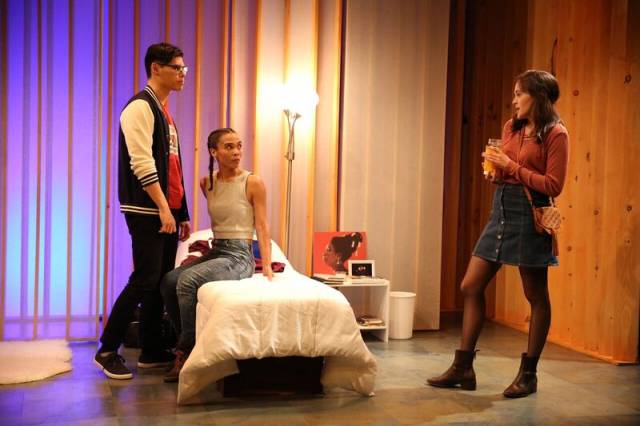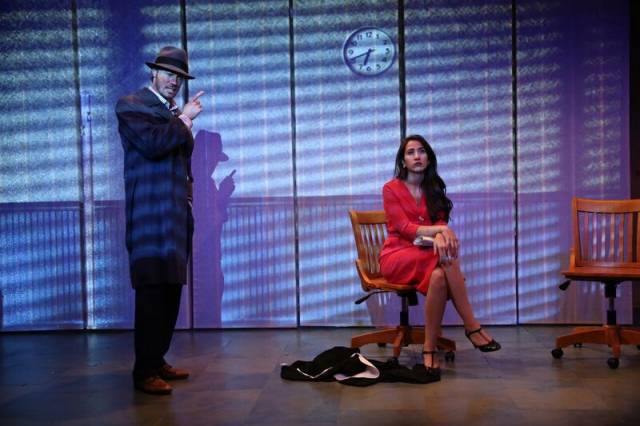

This year marks the 10th anniversary of 59E59 Theaters' Summer Shorts series, bite-size bits of theater for the warm weather that year after year prove to be every bit as provocative, touching and funny as their full length counterparts, thanks in large part to a serious amassing of theatrical talent, from scriptwriters to stagehands. I swung by one week night and beat the heat at Series B, one of two sets comprised of three, roughly thirty minute plays.
The first of the evening’s plays was Black Flag, an unsettling discourse on the prolonged tension that ensues when Georgia native, Evelyn (Francesca Carpanini), moves into her freshman year dorm in New York City and decides to decorate her side of the room with a big old Confederate flag. Deja (Suzette Azariah Gunn), her roomie from Detroit, is none too pleased. Spanning the first semester of the school year, playwright Idris Goodwin does a good job of unstitching several complicated rhetorical threads in a short amount of time, including, perhaps most provocatively, the reasons why Deja really doesn't want to make a scene about the whole thing. The two circle each other in a frustrating pattern of passive aggression ("Do you want me to take it down?” “No,” Deja insists again and again, "you can do what you want with your side of the room”) and willful ignorance, as Miss Georgia Peach is given endless opportunities to defend her stance on the flag and refusal to take it down, all of which boil down to “southern pride," from her momma and cousins to her peaches and Moonpies (yes, she keeps both by her bed).
Though Goodwin is clearly using the dorm room as a microcosm in which to work a thought experiment on the bounds of the First Amendment and the unthinkable things we see going on with race relations still today, the play somehow lacks emotional thrust, which is a surprise considering the visceral discomfort and disgust most of us have -- off the bat -- in reaction to the Confederate Flag. Perhaps I could never shake the improbability of this happening at a liberal arts college New York City; does that betray my own ignorance? Or perhaps I hold some hope, in the spirit of the young women’s affinity for each other and joint adventure moving to a sprawling and diverse metropolis in the pursuit of education, that rather than resorting to quiet -- undeniably justifiable -- rage and pain, Deja might have taken the opportunity to educate Evelyn. Would they not have both been better off for open discourse?

Though the author of the second play, Alexander Dinelaris, lists Birdman (or The Unexpected Virtue of Ignorance) among his writing credits -- easily one of my favorite films of 2014 for its originality alone -- Queen covers territory so well trodden it’s nearly hackneyed. Inspired by Gabriel García Márquez’s short story, “The Woman Who Came at Six O’Clock,” Queen tells the story of café proprietor “honest Joe” and the eponymous prostitute he loves. They have their ritual—every day she comes in and he feeds her—and it becomes clear that Joe wants to rescue Queen from her no-good life of sin; except he lives up to his nickname, and finds the limits of his heretofore unconditional love tested when she all but confesses to murdering a John and asks Joe to lie in order to serve as her alibi. However, as Queen and Joe, Casandera M.J. Lollar and Saverio Tuzzolo root the play with solid New Jersey accents and believably extreme emotions that lend the play an air of gravity and tension, Lollar’s tortured resignation met with Tuzzolo's tragic desperation to maintain the status quo.

The final play, Richard Alfredo’s The Dark Clothes of Night, is a complex, comedic and oddly moving send-up of film noir in which, in the vein of the dark, cult British show The Singing Detective, a college film professor, Rob Marlowe, retreats into delusions of himself as a private detective, Burke Sloane, in order to escape the unpleasant realities of his life, including a troubled career and crumbling marriage.
Dana Watkins anchors the play as Rob, the narcissistic and overzealous to the point of being vaguely fetishistic professor of film semiotics and Burke, a fast talking Gumshoe who powers through spates of alliteration and so-bad-they’re-great puns. James Rees is hilarious as an increasingly madcap variety of extras in Rob/Burke’s narrative, while Sinem Meltem Dogan, as Marlowe’s soon to be ex-wife, film student and femme fatale, straddles a line between ridiculous un-reality and the dead-serious vehicle for many of the play’s hard life lessons. Alfredo’s script is too smart and too nutty to be predictable, as he grafts 21st century anxieties about love and aging onto the Noir.
Though at moments I found myself wishing Series B had been even more off-the-wall, with well-oiled production thanks to stage manager Dee Dee Katchen, and sleek, minimal set design courtesy of Rebecca Lord-Surratt, Summer Shorts rang in their first decade with substance and plenty of style.